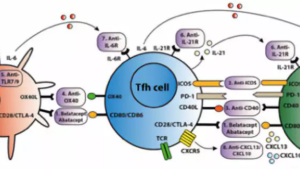October 28, 2024, Immune Tolerance

Despite the fact that short-term graft survival following kidney transplantation has achieved very high rates, its long-term survival rate remains unsatisfactory. Ten years after kidney transplantation, nearly half of all grafts have lost function.

Is there a biomarker that can indicate or even predict the outcome of a kidney transplant, enabling early intervention to extend graft survival? This is a question that transplant specialists and patients worldwide urgently seek to answer.
Today, Dr. Zhu explained:
Transitional B cells may serve as a novel prognostic indicator in kidney transplantation.
In the latest study on “transitional B cells”:
Transitional B cells express higher levels of the anti-inflammatory cytokine IL-10 and lower levels of the pro-inflammatory cytokine TNF-α.
IL-10
It plays a critical role in numerous conditions, including autoimmune diseases, severe infectious diseases, tumors, and transplantation immunity.
TNF-a
It plays a significant role in growth regulation, differentiation, inflammatory responses, viral replication, tumorigenesis, autoimmune diseases, and infections caused by viruses, bacteria, fungi, and parasites.
This characteristic enables transitional B cells to exert immunomodulatory effects.
A team of researchers from the U.S. and the U.K. discovered that T1 cells, one of two types of transitional B cells, express higher levels of IL-10 and lower levels of TNF-α compared to T2 cells.
They followed 45 patients who underwent kidney allograft biopsy due to elevated serum creatinine levels for 5 years. They found that patients with a low T1/T2 ratio exhibited significantly poorer allograft survival after 5 years of follow-up compared to those with a high T1/T2 ratio; this ratio serves as an independent prognostic factor for kidney allografts.
To validate these findings, they conducted the same study with another group of 97 patients with stable kidney transplant function and determined that the T1/T2 ratio is also a highly robust predictor of outcomes in these patients.
Although further validation is required, this study suggests that the T1/T2 ratio can serve as an indicator of graft survival and as a reference for individualized adjustment of immunosuppressive therapy in kidney transplant patients.

The Kidney Transplantation Center of Zhongshan Hospital, affiliated with Fudan University, has a rich history of kidney transplantation and successfully performed China’s first kidney transplant in a child with Denys-Drash syndrome.
In partnership with the Shanghai Soong Ching Ling Foundation, we have launched the “Kidnewer” Children’s Kidney Transplant Charity Project to provide charitable support to families of children with kidney transplants facing financial hardship.

We will collaborate with you to alleviate the suffering of patients with uremia.
Written by | Zhu Dong, Edited by | Wang Jina
This article is an original publication of the “Kidney Transplantation, Zhongshan Hospital, Fudan University” WeChat public account. Reproduction requires authorization from this account and the original author, with proper attribution. To care for your kidneys, begin by following the “Kidney Transplantation, Zhongshan Hospital, Fudan University” WeChat public account. You can also click [Read the Original] to explore“ “How Drug Concentrations Affect Treatment Outcomes and How Should We Manage Them?”。




